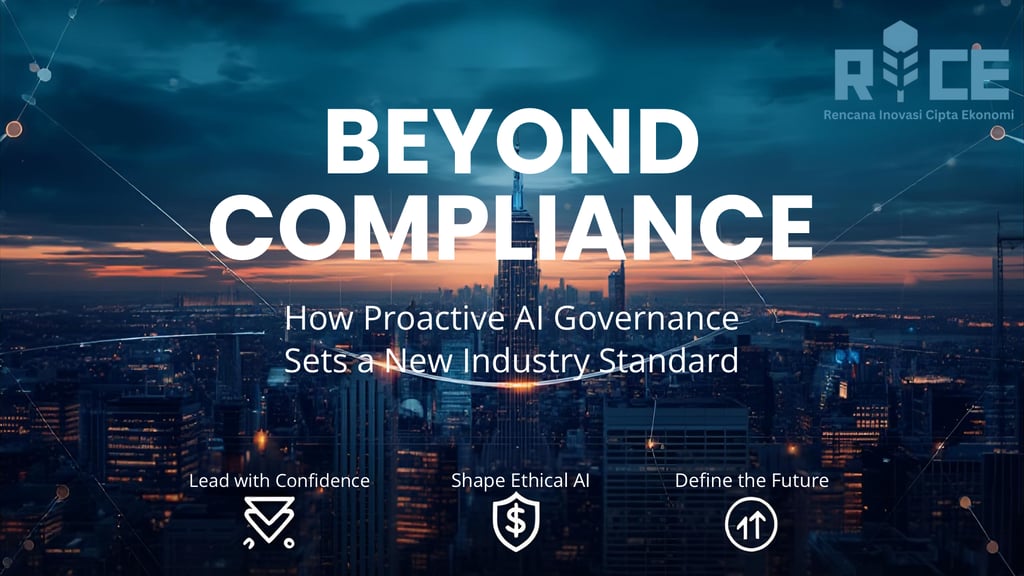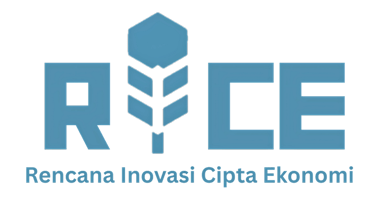Beyond Compliance: How Proactive AI Governance Sets a New Industry Standard
Transform regulatory challenges into strategic advantages, set new ethical standards, and thrive in AI's evolving landscape
AI INSIGHT
Rice AI (Ratna)
10/28/20256 min read


Imagine an AI landscape where regulatory compliance isn't a reactive burden, but a proactive advantage. Where future AI regulatory hurdles are anticipated and addressed long before they materialize, transforming potential risks into strategic opportunities. This isn't a futuristic dream, but a tangible reality being forged by visionary enterprises today. In an era of rapidly evolving artificial intelligence and fragmented global regulations, one hypothetical, forward-thinking enterprise has demonstrated that moving "beyond compliance" is not only possible but essential for setting a new AI industry standard. Their journey offers invaluable insights for any organization committed to sustainable and responsible AI development.
The Unfolding Regulatory Landscape: A Minefield for the Unprepared
The pace of AI innovation has consistently outstripped the rate of regulation. This creates a complex and often unpredictable environment for businesses leveraging AI. Navigating this landscape requires more than just reacting to new laws; it demands foresight and a robust AI governance strategy.
The Evolving Patchwork of AI Regulation
Globally, AI regulation is a rapidly evolving mosaic. The European Union's AI Act (suggested external link: https://eur-lex.europa.eu/legal-content/EN/TXT/?uri=CELEX%3A52021PC0206) aims to categorize AI systems by risk, imposing stringent requirements. Concurrently, various U.S. states and federal agencies are developing their own guidelines, often focusing on specific sectors or applications like biometric data and automated decision-making. This fragmented and dynamic regulatory environment makes blanket compliance an increasingly complex and resource-intensive challenge for enterprises operating across jurisdictions.
The High Stakes of Non-Compliance
Failure to adhere to emerging AI laws carries significant repercussions. Beyond hefty financial penalties that can cripple balance sheets, the damage extends to reputational harm, erosion of customer trust, and even market exclusion. Enterprises face potential lawsuits, mandatory operational halts, and a diminished competitive edge. Effective AI risk management is no longer optional; it's a strategic imperative. The cost of retrofitting systems or defending legal challenges far outweighs the investment in proactive measures.
The Visionary Approach: From Reactive to Predictive AI Strategy
The enterprise that set this new standard understood that traditional, reactive compliance models were insufficient for AI. They embraced a philosophy of predictive governance, embedding future-proof principles into their AI strategy from its very inception. This involved a multi-faceted approach, prioritizing foresight and collaboration.
Anticipating Future Frameworks
Instead of waiting for legislation, this enterprise actively engaged with emerging policy discussions. They invested in dedicated teams to monitor legislative drafts, academic research on ethical AI, and public discourse surrounding AI's societal impact. By participating in industry consortiums and dialogue with regulatory bodies, they gained early insights into potential future requirements. This intelligence allowed them to build their AI systems with anticipated guardrails already in place, significantly reducing future refactoring needs.
Embedding Ethical AI Principles from Inception
The core of their strategy was a commitment to ethical AI principles, not as an afterthought, but as foundational design tenets. They developed an internal ethical AI framework (suggested internal link: Our Guide to Ethical AI Frameworks), emphasizing values like algorithmic transparency, accountability, human oversight, and fairness. Every AI project was vetted against these principles from its ideation phase, ensuring that ethical considerations were as critical as technical feasibility or business value. This proactive stance minimized the likelihood of developing systems that would later fall foul of ethical or regulatory scrutiny.
Cross-Functional AI Governance Committees
Recognizing that AI governance transcends any single department, the enterprise established a standing cross-functional committee. This committee comprised experts from legal, ethics, engineering, product development, and business units. Their mandate was to review AI initiatives, assess potential risks, and ensure alignment with both internal ethical guidelines and anticipated external regulations. This collaborative approach fostered a holistic understanding of AI compliance and embedded responsibility across the organization.
Building a Resilient AI Governance Framework: The Blueprint for Success
The enterprise meticulously constructed a robust AI governance framework designed for resilience and adaptability. This blueprint integrated technological solutions, rigorous processes, and a culture of continuous improvement, effectively navigating potential AI regulatory hurdles.
Data Governance as the Foundation
At the heart of compliant AI lies impeccable data governance. This enterprise prioritized establishing stringent data privacy and security protocols from the outset. This included comprehensive data mapping, clear consent mechanisms, robust anonymization techniques, and secure data storage solutions. They understood that AI models are only as ethical and compliant as the data they are trained on. By adhering to global data protection standards (like GDPR and CCPA) even for non-mandated AI applications, they built a resilient data infrastructure (suggested internal link: Best Practices in Data Governance for AI) that inherently supported compliant AI development.
Explainable AI (XAI) and Interpretability by Design
Long before explainable AI (XAI) became a common regulatory demand, this enterprise mandated its incorporation into model design. They prioritized developing algorithmic transparency features that allowed stakeholders—from developers to end-users and regulators—to understand how an AI model arrived at a particular decision. This included utilizing interpretable models where possible, developing post-hoc explanation techniques, and ensuring clear documentation of model architecture, training data, and decision logic. This proactive investment in XAI significantly de-risked their AI deployments and facilitated easier auditing and compliance verification.
Proactive Bias Detection and Mitigation
Addressing algorithmic bias was another critical pillar of their framework. They implemented sophisticated tools and processes for continuous bias detection and mitigation throughout the AI lifecycle. This involved meticulously vetting training datasets for representational biases, employing debiasing techniques, and establishing rigorous testing protocols to identify discriminatory outcomes in model predictions. Furthermore, human-in-the-loop processes were established for sensitive decisions, ensuring oversight and the ability to intervene. Their commitment to fairness in AI positioned them ahead of emerging mandates for equitable AI systems.
Leveraging Technology for Regulatory Intelligence
To maintain their predictive edge, the enterprise deployed advanced technological solutions specifically for regulatory intelligence. This included AI-powered platforms designed to continuously scan, interpret, and track legislative changes, policy proposals, and judicial rulings related to AI worldwide. These systems provided real-time alerts and analyses, allowing the governance committee to swiftly adapt their internal guidelines and AI project requirements. Firms like Rice AI are leaders in this space, offering specialized AI compliance tools that leverage machine learning to anticipate and analyze regulatory shifts. Their platforms can dissect complex legal texts, identify relevant clauses, and project potential impacts, giving enterprises a significant head start in navigating the intricate web of AI regulatory hurdles. This strategic partnership with cutting-edge AI solutions providers is key to proactive governance.
Tangible Outcomes: A New Paradigm for AI Leadership
The enterprise's dedication to predictive AI governance yielded significant, measurable benefits, solidifying its position as an industry leader and demonstrating the power of moving "beyond compliance."
Strategic Advantage Through Trust
By consistently demonstrating a commitment to responsible and ethical AI development, the enterprise cultivated deep trust with customers, partners, and regulators. This enhanced trust translated directly into a powerful competitive advantage. Customers were more willing to adopt their AI-powered products and services, knowing they were developed with utmost care for privacy, fairness, and transparency. Regulators viewed them as a reliable partner, often consulting them on policy development, further cementing their influence and reputation. This focus on building trust became a unique differentiator in a crowded market.
Operational Efficiency and Reduced Risk
The proactive nature of their governance framework drastically reduced operational disruptions and legal expenditures. By designing for compliance and ethics from the start, they avoided costly retrofits, legal battles, and reputational crises that plagued many reactive competitors. Their AI risk management was fundamentally superior, leading to smoother product launches, faster market acceptance, and more efficient resource allocation. This meant that development cycles were not derailed by unexpected regulatory changes, allowing for more consistent innovation.
Influencing the Industry Dialogue
Perhaps most significantly, this enterprise's exemplary AI governance practices began to shape the broader industry dialogue. Their internal standards, frameworks, and methodologies became de facto benchmarks that other organizations strived to emulate. They actively shared their learnings and best practices, contributing to the development of industry-wide codes of conduct and advocating for sensible, innovation-enabling regulations. Their leadership transformed the perception of AI governance from a burdensome necessity into a strategic imperative that fosters innovation and responsible progress. This influence demonstrates how individual enterprise efforts can catalyze broader systemic improvements in AI policy and practices.
Conclusion: The Future of Responsible AI Development
The journey of this pioneering enterprise underscores a critical truth: in the rapidly evolving world of artificial intelligence, simply reacting to regulations is no longer sufficient. True leadership lies in foresight, in anticipating AI regulatory hurdles, and in proactively building robust, ethical, and transparent AI governance frameworks. This "beyond compliance" mindset not only mitigates risks but unlocks significant strategic advantages, fostering trust, driving innovation, and ultimately setting a new AI industry standard.
For organizations aiming to not just survive but thrive in the complex future of AI, adopting a forward-looking, predictive governance strategy is paramount. It requires a cultural shift, a commitment to ethical AI, and the strategic integration of advanced tools and expertise. Companies like Rice AI are instrumental partners in this transformation, providing the specialized knowledge and technological solutions needed to build dynamic AI compliance and AI risk management systems. Their platforms can empower enterprises to navigate the complexities of AI regulation, turning potential liabilities into powerful accelerators for growth and market leadership. The future belongs to those who don't just follow the rules but help write them.
References
European Parliament. (2021). Proposal for a Regulation on a European approach for Artificial Intelligence. Retrieved from https://eur-lex.europa.eu/legal-content/EN/TXT/?uri=CELEX%3A52021PC0206
National Institute of Standards and Technology. (2023). Artificial Intelligence Risk Management Framework (AI RMF 1.0). Retrieved from https://nvlpubs.nist.gov/nistpubs/ai/NIST.AI.100-1.pdf
#AIGovernance #AIRegulation #AICompliance #EthicalAI #PredictiveCompliance #IndustryStandard #ArtificialIntelligence #RiskManagement #DataPrivacy #AlgorithmicTransparency #BiasMitigation #AIDevelopment #XAI #AIPolicy #FutureOfAI #DailyAIInsight
RICE AI Consultant
To be the most trusted partner in digital transformation and AI innovation, helping organizations grow sustainably and create a better future.
Connect with us
Email: consultant@riceai.net
+62 822-2154-2090 (Marketing)
© 2025. All rights reserved.


+62 851-1748-1134 (Office)
IG: @riceai.consultant
